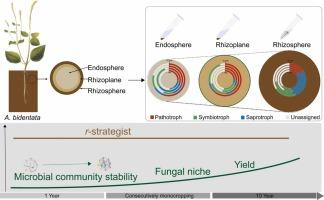根-土壤连续统中微生物介导的生态恢复力是牛膝适应连作的基础
IF 6.2
1区 农林科学
Q1 AGRICULTURAL ENGINEERING
引用次数: 0
摘要
在长期连作条件下,牛膝草通过维持稳定的微生物群落来维持较高的产量和质量,从而促进了植物-土壤的正反馈,并展示了生态弹性。我们的研究阐明了长期单一栽培如何改变土壤-根连续体中的微生物群落。根际和内圈细菌多样性增加,而根际和内圈真菌多样性减少,表明细菌和真菌群落之间存在明显的生态分化。细菌表现出生态位扩张,从k策略转向r策略,采取更具竞争性的资源获取策略。相反,真菌变得越来越资源专门化:共生类群占主导地位的根室,而致病类群积累在根面和内球层。群落组装从随机过程转向环境过滤,特别是在内圈,反映了随着时间的推移而加剧的选择压力。网络分析确定了在单一栽培胁迫下稳定微生物网络和维持生态系统功能的关键分类群,其中最著名的是假单胞菌。土壤灭菌使百足草生物量累积减少43% %,生物活性物质(β-ecdysterone)减少25.71% %,(25R-inokosterone)减少28.57% %,(25S-inokosterone)减少25% % (P <; 0.05)。与未接种的对照相比,外源接种促进植物生长的根细菌菌株铜绿假单胞菌使根鲜重提高了33.88 %,但没有显著改变外生激素谱。这些发现为微生物适应单一栽培提供了有价值的见解,提供了管理土壤微生物组的策略,以提高作物的抗复性和可持续的农业生态系统管理。本文章由计算机程序翻译,如有差异,请以英文原文为准。

Microbially mediated ecological resilience in the root-soil continuum underlies Achyranthes bidentata adaptation to continuous cropping
Under long-term continuous cropping, Achyranthes bidentata sustained higher yield and quality by maintaining a stable microbial community that fosters positive plant–soil feedback and demonstrates ecological resilience. Our study elucidates how long-term monoculture alters microbial communities across the soil–root continuum. Bacterial diversity increased in both the rhizosphere and endosphere, while fungal diversity decreased in the rhizoplane and endosphere, illustrating a pronounced ecological divergence between bacterial and fungal communities. Bacteria exhibited niche expansion, shifting from K-strategists to r-strategists, adopting more competitive resource-acquisition strategies. In contrast, fungi became increasingly resource-specialized: symbiotic taxa dominated root compartments, while pathogenic taxa accumulated in the rhizoplane and endosphere. Community assembly shifted from stochastic processes to environmental filtering, particularly in the endosphere, reflecting intensified selection pressures over time. Network analysis pinpointed keystone taxa, most notably Pseudomonas spp., that may stabilize microbial networks and sustain ecosystem functions under monoculture stress. Soil sterilization decreased A. bidentata biomass accumulation by 43 % and reduced bioactive compounds by 25.71 % (β-ecdysterone), 28.57 % (25R-inokosterone), and 25 % (25S-inokosterone) (P < 0.05). Exogenous inoculation with the plant growth-promoting rhizobacteria strain Pseudomonas aeruginosa enhanced root fresh weight by 33.88 % compared to the non-inoculated control without significantly altering ecdysteroid profiles. These findings provide valuable insights into microbial adaptations to monoculture, offering strategies for managing soil microbiomes to improve crop resilience and sustainable agroecosystem management.
求助全文
通过发布文献求助,成功后即可免费获取论文全文。
去求助
来源期刊

Industrial Crops and Products
农林科学-农业工程
CiteScore
9.50
自引率
8.50%
发文量
1518
审稿时长
43 days
期刊介绍:
Industrial Crops and Products is an International Journal publishing academic and industrial research on industrial (defined as non-food/non-feed) crops and products. Papers concern both crop-oriented and bio-based materials from crops-oriented research, and should be of interest to an international audience, hypothesis driven, and where comparisons are made statistics performed.
 求助内容:
求助内容: 应助结果提醒方式:
应助结果提醒方式:


